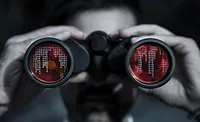Josh Ball: Prioritizing Partnerships

When it comes to a top-notch security program, good relationships with external entities are paramount to success. It’s a concept Josh Ball, Director of Public Safety at the Louisville Muhammad Ali International Airport (SDF) in Louisville, Kentucky, has prioritized. “I’ve been here going on 12 years now and historically speaking, we were very siloed from our partners,” says Ball. “When I was promoted to assistant director, one of my goals was to start breaking down those silos.”
Last year, when he became director, the airport’s director told Ball to focus on making sure that all their partners and stakeholders felt good about their relationship with Ball’s team, the Department of Public Safety. To that end, the team spends a significant amount of time reaching out to different agencies, traveling around and sharing resource data. “I do everything I can to make sure that the bond is strong, and it has really paid off,” notes Ball.
The fruits of his team’s labors showed when President Trump was in Louisville recently. The local Secret Service field office had nothing but praise for how well Ball’s team worked with all the federal and local agencies involved. “There were never any turf wars and that made me happy because in security, sometimes it’s easy to say, ‘This is my sandbox, stay out of it.’ But I know I don’t have all the resources to take care of everything I need at any one time, and I need people’s help. I found out that when you ask people for help, they realize they also need your help as well,” Ball says.
Louisville Muhammad Ali International Airport is the world's airline headquarters for UPS and Worldport, their all-points international air express hub, making the airport the third largest cargo hub in North America and seventh in the world. With a constantly changing customer population, plus airport employees, airline employees and thousands of UPS employees on site, “every day is definitely a brand-new experience,” says Ball, citing this factor as one of the aspects he likes most about working in his sector.
He also has a passion for trying to find potential issues and vulnerabilities and then working with the airport’s planners on implementing cost-effective solutions into a future project. “We have so many different regulatory entities that are involved in airports, so some projects might be a couple years down the road,” Ball says. “It’s a fun dynamic.”
In Public Safety, everyone is cross-trained, so he has fully certified police, fire and EMTs on staff. “This allows us to be versatile – we can respond to numerous types of incidents from any location and assist each other,” says Ball. The team also works closely with the local metro police department, the Jefferson County sheriff’s office, and the dignitary protection teams for residents, U.S. Senator Mitch McConnell and his wife, U.S. Secretary of Transportation Elaine Chao, as well as UPS Corporate Security, the Drug Enforcement Administration (DEA), the FBI and the Secret Service.
In Ball’s sector, two of the biggest challenges are terrorism and drones. “We know aviation is still a target of terrorists,” says Ball. “And with the radicalization of domestic U.S. citizens, I think there’s the least amount of predictability in what could be a threat than we’ve ever seen before.”
There has also been a radical increase across the industry in drone interference. “Even if I spent a million dollars on a brand-new drone detection system, the current regulations and laws are written to where I have some challenges when it comes to actual mitigation. If I interfere with that drone, I have interfered with an aircraft and that’s a federal offense. Even if it’s not a true security threat – maybe it’s just an operational disruptor with no ill intent – it’s still a huge disruption. That’s one of the big things that we’ve been talking about at industry conferences, and we still have a way to go before we have a solution in hand,” Ball says.
Ball has found that being actively engaged in the industry by way of conferences and trade groups (he’s involved in several) is highly beneficial for a strong security program. “We have our own distribution groups and if someone’s having a problem, we can send out an email to the group and find out who has had this problem before and how to fix it,” Ball says. “These contacts, that network, those relationships, are a huge part of success because someone has done what you need to do before, and there’s no reason to try to reinvent it all when there’s someone out there that’s willing to help out.”
In his time off, Ball can often be found at dance studios. “I have two daughters,” he explains. “I also absolutely love lawn care, and I spend a lot of time outside trying to have the greenest grass in the neighborhood. It gives me peace and time to clear my mind.”
Looking for a reprint of this article?
From high-res PDFs to custom plaques, order your copy today!





